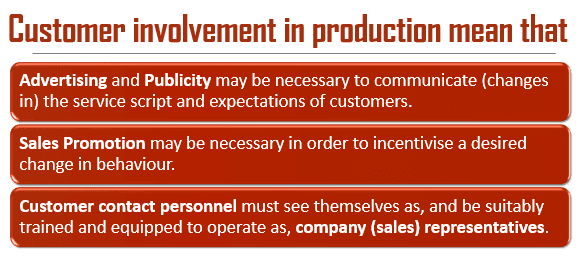Most of the factors which differentiate goods from services create distinctive marketing implications for service communication strategies.
For example:
The intangible nature of services means that
- Advertising is often necessary to communicate standing and reputation and, thereby, to build trust and confidence; to put a personal ‘face’ and personality on a service organization; to foster realistic expectations.
- Publicity and Public Relations initiatives often enhance credibility and acceptance.
- Tangible clues and symbols can help to make intangible claims easier to grasp.
- Sales Promotion can be used to provide a (tangible) sense of value-added.
A reduced role for intermediaries means that
- Service marketers who sell directly have no need of trade promotion but do need well-developed interpersonal skills.
- Customer service personnel frequently require personal selling skills
3. Customer involvement in production means that
- Advertising and Publicity may be necessary to communicate (changes in) the service script and expectations of customers.
- Sales Promotion may be necessary in order to incentivize a desired change in behavior.
- Customer contact personnel must see themselves as, and be suitably trained and equipped to operate as, company (sales) representatives.
Ways of physical evidence to ‘communicate’
A service organization’s servicescape and physical evidence is an expression of its identity and ‘personality’, and consequently serves to communicate something of its (competitive) market positioning and standing, its values, professionalism and corporate image, and its commitment to its customers and staff.
This physical evidence occurs within and without an organization and communicates not only to customers (prospective and actual) but to the wider business and social community of which it is a part, suppliers, competitors, people who may be of influence, and staff.
The need to balance supply and demand means that
Mainly supply and demand are influenced by promotional activities of product or services as well advertising also play a vital role in manipulating market demand accordance with the available capacity.
What role do advertise, and publicity play in:
- (a) attracting new and additional customers?
- (b) retaining current customers?
Advertising and Publicity both serve to attract new and additional customers by generating and building awareness, stimulating interest in the service offering (both core and supplementary elements), communicating appealing benefits and incentives, and generally building an attractive and appealing service image.
Positive or favorable publicity, in the form of word-of-mouth, referrals and third party recommendations, also has the advantage of building the image, reputation and credibility of a service provider which, because of the source as much as the nature of the publicity itself, also helps to stimulate interest, enquiry and patronage.
To the end of retaining current customers advertising and publicity play a useful role in reminding and reinforcing positive perceptions, behavior and patronage, informing customers of special offers or new and additional supplementary services.
Generally ensuring that the name and image of a service provider, what it stands for and what it has to offer, are kept favorably in the forefront of customers’ minds.
Note: These are but a few examples of significant implications for marketing communications arising from the distinguishing characteristics of services. This is a key topic that may well warrant extended tutorial discussion so that students gain a sound understanding of what in a service setting impacts on marketing communications and the form it may take, and why.




